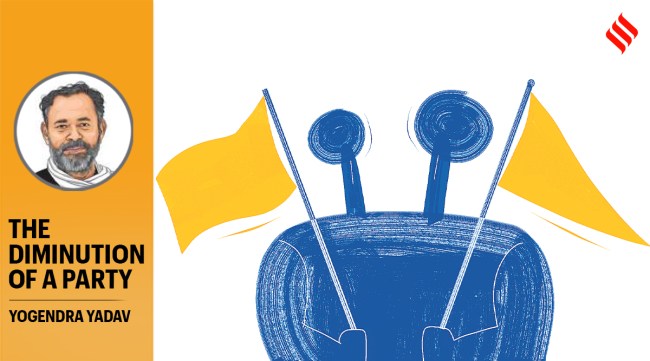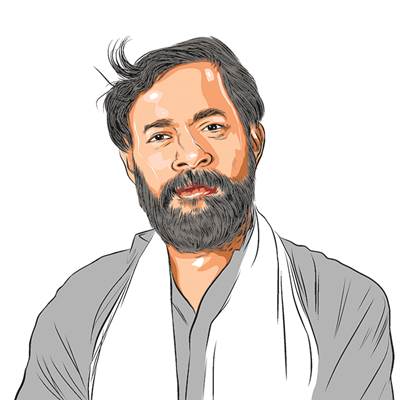Opinion Yogendra Yadav writes: How the Akali Dal was diminished
At least three sets of red lines were crossed by Akal Takht's public interrogation of Sukhbir Singh Badal, and sentencing.
 The SAD originated as a panthic organisation that has its roots in a religious reform movement. (Illustration by C R Sasikumar)
The SAD originated as a panthic organisation that has its roots in a religious reform movement. (Illustration by C R Sasikumar) Something deeply troubling is happening in Punjab. And it is not just the condemnable bid on the life of Akali leader Sukhbir Singh Badal. The manner in which the Akal Takht has intervened to resolve the crisis of the Shiromani Akali Dal (SAD) raises deeper political and legal-constitutional issues that must not be glossed over. When we face nothing short of a dismantling of the secular republic, we cannot afford to be casual or selective about such issues.
The facts of the case are straightforward. The SAD faces an existential crisis following a series of electoral debacles, ever since the younger Badal inherited his father’s political legacy and courted serious charges of misgovernance, corruption and political ineptitude. This led to a full-blown rebellion within the party that threatened its disintegration. This is when the Akal Takht, the highest religious authority of the Sikhs, stepped in. It summoned Sukhbir Badal, interrogated him publicly on allegations against his government and his leadership of the party. He was sentenced to a symbolic seva at the Golden Temple and a committee was appointed to restructure the party. The attempt on Sukhbir Badal’s life, thankfully averted by an alert policeman, happened when he was serving his sentence.
Now, some of this is perfectly understandable. A robust political articulation of regional concerns is the glue that binds many border states to the Indian union. Therefore, an effective marginalisation and possible extinction of a regional political force like the SAD in a sensitive state like Punjab should be a matter of concern.
Its absence from the political spectrum would hurt India as well as Punjab. Such a vacuum may spawn extremist voices outside democratic politics. Besides, a significant section of Sikhs inside and outside Punjab still nurse the wounds of 1984, especially since nothing has happened against the guilty. The presence of the SAD in state and national politics, with all its flaws and failures, is a soothing signal to the community. Also, there is no doubt that Badal Jr has not inherited the political sagacity, tact and popularity of his father. He has been driving the party downhill. Someone needed to intervene to stem this free fall.
This much makes sense. But the real issues are: Who could have, or should have, intervened in this matter? Was it appropriate for the Akal Takht to intervene and arbitrate? And, was it appropriate for the SAD to submit itself to the supreme command of the Akal Takht? This is not an internal matter of a party or of a community or between a party and some religious leaders. There are at least three sets of red lines that seem to have been crossed here.
First of all, there is a regress of the SAD from a regional party to a party of one religious community. The SAD originated as a panthic organisation that has its roots in a religious reform movement. But following the successful return of the SAD to power in the post-terrorism days, the Akali Dal made a big shift in 1996 in its Moga convention from being a “panthic” party to being a Punjabi party, from a religious-regional to a purely regional entity. While the SAD continued to mainly represent Sikh interests, over the years it offered membership and leadership positions to many Hindus. The message of the latest developments is loud and clear: It is a party of and for the panth, of the majority Sikh community in Punjab, accountable to its religious establishment. If we accept this, how do we critique those who wish to run this country as per the wishes of the majority Hindu community?
The second issue is about constitutional propriety. How can a registered and recognised political party, that is required to take a pledge of secularism, submit itself to the supreme command of a religious authority? Obviously, the constitution of the SAD, mandated for all parties under the law, does not mention the Akal Takht as the arbiter of its internal disputes. Now, a political party should be free to take its ideological guidance and advice from outside the party. There is nothing anyone can do if a party leadership seeks informal advice from religious leaders. Indeed, there are parties that are known to be tied to caste or religious organisations and that take their guidance. But here we are speaking of a formal trial conducted in full public view and a binding judgment. How does that sit with the role of a political party that competes for constitutional office? How does anyone, then, question the role of the RSS in running the affairs of the BJP and its governments?
Finally, there are serious concerns about the propriety of the Akal Takht interfering in political matters. The Akal Takht is not just a spiritual institution of a religious community, independent of law and state, that exercises moral authority. The jathedars of the Akal Takht are appointed and removed by the Shiromani Gurdwara Parbandhak Committee (SGPC) established by the law of the land. Needless to say, the Sikh Gurdwaras Act, 1925 nowhere authorises the SGPC or anyone appointed by it to interfere in politics. The Akal Takht is there to offer guidance to the community in faith-related matters. And if both parties agree, it may adjudicate or arbitrate in social disputes. There have been questions about its authority to “excommunicate” members of the community. Former Union Home Minister Buta Singh was excommunicated for his alleged complicity in rebuilding Harmandir Sahib without involving the community following Operation Blue Star. Surjit Singh Barnala, then the CM of Punjab, was punished by the Akal Takht for ordering the police to enter the Gurdwara. These were controversial but borderline cases, way back in the past and pertaining to religious matters.
The present case is qualitatively different, and crosses the red line. The public trial of Sukhbir Badal was political. Only one of the many questions formally posed by the Akal Takht to him related to a religious issue, namely his mishandling of the “be-adabi” (desecration) of the holy Granth. Everything else pertained to his role in government and as leader of the party that affected the “panth”. Of course, the Akali Dal and its leaders have no issues with it; they must have sought this intervention. Yet that does not answer how this purely religious institution acquired the authority to order the restructuring of a political party. If this is acceptable, what’s wrong with Gurmeet Ram Rahim Singh of Dera Sacha Sauda instructing his followers to vote for the BJP?
Worse, would this action not reduce the Akal Takht to the level of any political entity, subject to the same kind of public scrutiny and mud-slinging that any political body exposes itself to? Would the Akal Takht now fall back upon the “piri-miri” doctrine that argues for non-separation of religious and political authority for the Sikh community? If this holds for the Sikhs, how can the BJP not invoke it to defend the toxic intrusion of babas, yogis and swamis that it has unleashed into the body politic?
The writer is member, Swaraj India and national convenor of Bharat Jodo Abhiyaan. Views are personal






